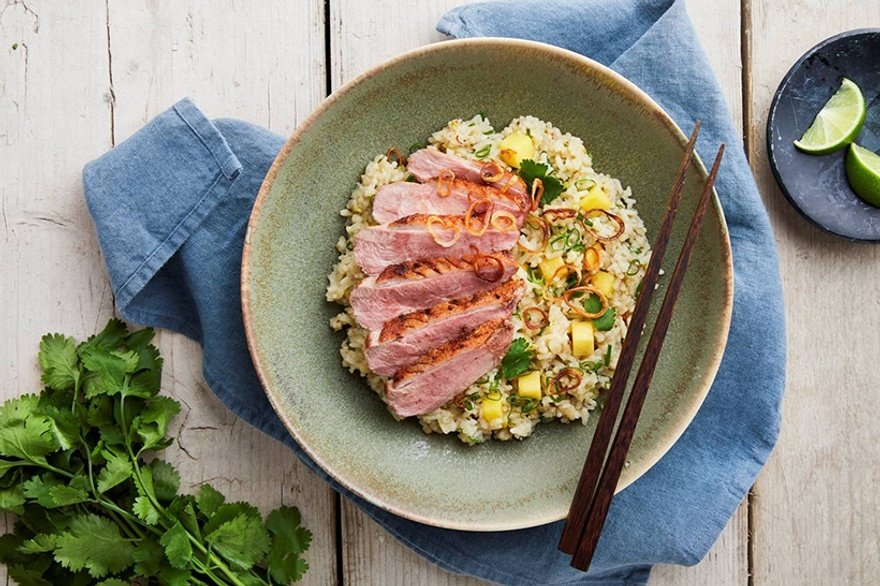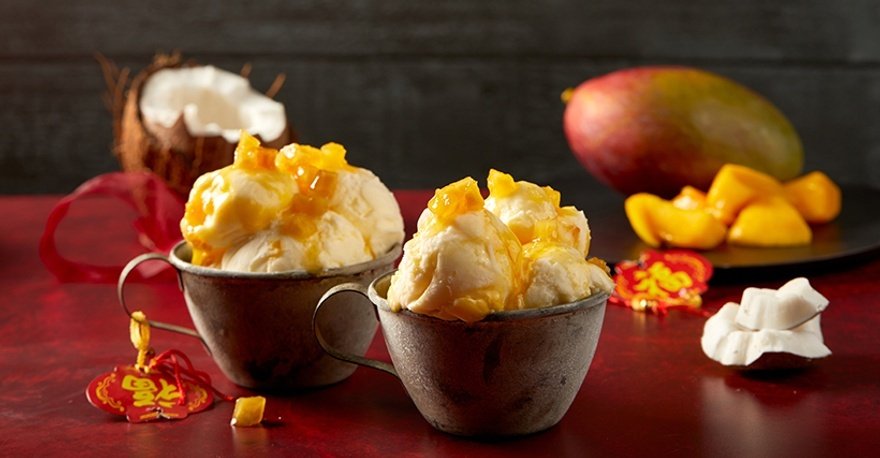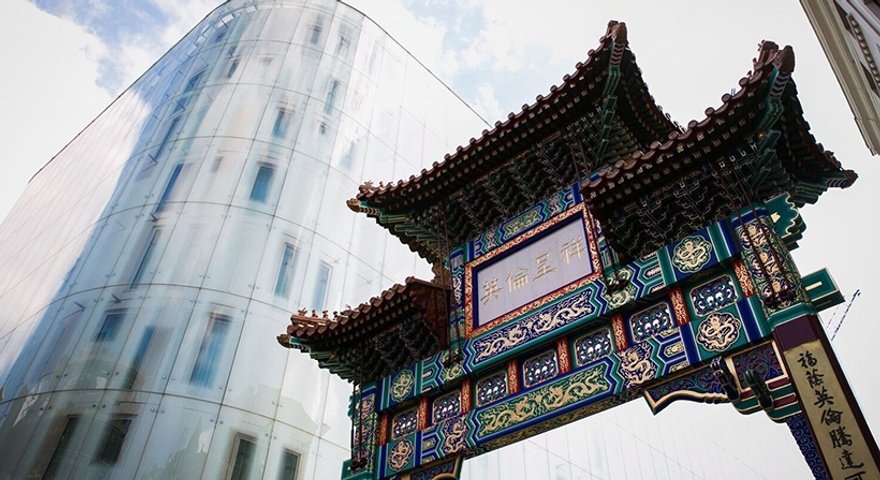Eye of the tiger: make your menu for Chinese New Year
As the Year of the Tiger dawns, Anne Bruce explores how the creature can bring promising symbolism when laying on a feast for Chinese New Year
The tiger, known as the king of all beasts in China, represents strength, the exorcising of evil and braveness – just the sort of beast any business would appreciate by its side, lending a helping paw this year. Chinese New Year arrives on 1 February, shortly before the Beijing Winter Olympics from 4-20 February, so there is a big opportunity for restaurants and foodservice operators to get creative around Chinese New Year.
So how should you celebrate and make it a lucky Chinese New Year? What do you need on the menu to welcome in this Year of the Tiger, and what are the meanings behind some of the traditional foods that are served at this celebratory time?
Food plays a vital part in the celebrations, with many carrying meaningful, lucky and auspicious significance for the New Year. Caterers should ensure they're well-stocked with key products including noodles, tofu, fish and chicken, as well as essential cooking sauces, such as soy sauce, comments Maria Chong, managing director of Chinese sauce supplier Lee Kum Kee Europe.
Dumplings are an essential dish during Chinese New Year, often eaten on New Year's Eve, because their Chinese name, jiăozi, means ‘changing of years', Chong says. They are shaped like an ancient Chinese gold ingot, representing wealth, and are usually filled with minced pork, beef or lamb, or a whole shrimp marinated with soy sauce. Dumplings are dipped in seasoned rice vinegar, sometimes with Chiu Chow chilli oil added for a spicy kick, Chong suggests.
Fish is another auspicious choice as the Chinese character for fish is ‘yú', which means surplus and fortune. Popular traditional ways to serve fish include steaming it or deep-frying it and dressing with soy sauce or sweet and sour sauce.
Noodles are another special food for Chinese New Year, symbolising longevity. Egg noodles, rice noodles or glass noodles can be stir-fried with sliced meat and vegetables, or served as soup noodles cooked in a broth, says Chong. For Chinese New Year, long noodles are the order of the day, depicting long life. In fact, at many Chinese tables it is forbidden to cut your noodles, and you should try not to chew them either – slurping, however, is highly acceptable, says Greta Strolyte, brand manager at noodle supplier Lucky Boat. Pan-Asian favourites such as stir-fried noodles make a versatile option, great for on-the-go or eat-in dining, she recommends.
Tofu in Chinese is ‘dÒu fu' which sounds similar to another Chinese word which means ‘everybody is happy', and that can't be a bad thing in a restaurant setting. Tofu can appear in salads with spring onions, in soup with seaweed and soybean sauce, or braised with soy sauce.
There is also a rich tradition of vegetable dishes to draw on for the Chinese New Year menu, for example broccoli means happiness, health and liveliness, and water chestnut represents unity. When looking at a Chinese New Year dining table, not only are most dishes combinations of meats and vegetables, but there will be at least one individual vegetable dish to share.
Chefs and operators can also elevate their Chinese New Year dishes by dialling up the rice they use, suggests Annette Coggins, head of foodservice at Tilda UK. A swap from plain rice to jasmine rice, for example, will add an extra dimension and flavour to dishes. If you simply add ‘fragrant jasmine rice' to your menu, diners will pay as much as 50p more, Tilda research suggests, she says.
East meets West
With growing consumer interest in Asian food, Chinese New Year also gives chefs and caterers a platform to explore new dishes and experiment with fusion flavour combinations.
Grilled leg of lamb would be a good choice, recommends Chong at Lee Kum Kee. The sheep, which served as currency in ancient times, is an auspicious animal in Chinese society signifying wealth, luck, and a promising new year.
Chicken also signifies a good beginning to the year, as well as an abundance of happiness and prosperity. Serve chicken with a Chinese-style honey barbecue marinade for a Chinese twist, suggests Chong.
Mark Eastman, gelato and ice-cream technician at ingredients supplier Henley Bridge comments that caterers can also have some fun with desserts to mark the New Year: "For Chinese New Year, why not offer a taste of the Orient with coconut ice-cream rippled with mango sauce," he says. "Serve in bowls and top with mango sauce or fresh slices of mango and lime zest." This year, the company has developed a recipe for rice pudding and lychee ice-cream, specifically with Chinese New Year in mind.
Research from YouGov on the UK's favourite takeaways has revealed that Chinese food takes top choice across most areas of Britain, and in all age groups, comments Strolyte at Lucky Boat. Chinese cuisine proves the most popular choice, with both the 25- to 49-year-old category (29%) and 50- to 64-year-old category (26%) picking it as their favourite.
So there is no doubt that diners will be more than happy to welcome in the Year of the Tiger this Chinese New Year with a special menu. Get it right and you are almost guaranteed to make your sales roar over this celebratory period.
Spring Festival 2022: the 15 days of Chinese New Year
Lunar New Year's Eve (January 31)
Good fortune in the form of money is given by the older generation to the younger. Chicken is always served, and fish is eaten as the main part of the meal, as fish symbolises a surplus at the end of the year. Dumplings are a traditional dish of the New Year's Eve celebration.
The Lunar New Year (February 1)
A big feast is prepared for Chinese New Year's Day. Some Chinese families keep the tradition of the first dinner of the year being a vegetarian dinner.
Eating noodles on Chinese New Year's Day symbolises good health and longevity. It is also tradition to braise mushrooms and lettuce in oyster sauce during Chinese New Year for a year of fortune ahead, as lettuce in Chinese is ‘san choy' which rhymes with ‘making money'.
Day five of the lunar calendar
This day is believed to be the birthday of the God of Fortune, celebrated with another large feast.
Day eight of the lunar calendar
This is the day that businesses reopen. The word ‘eight' has a similar pronunciation to ‘fortune' in Chinese, making it a lucky number. Day eight is celebrated with a feast that is laid on at work.
Day 15 of the lunar calendar: Yuan Xiao
Chinese New Year celebrations draw to a close on Yuan Xiao, which is on 15 February. It is also called the Lantern Festival and Chinese Valentine's Day, as people write poems and riddles on lanterns. Glutinous rice balls with sweet fillings, such as black sesame seed paste, red beans and lotus seed paste are eaten.
All lucky money (red packets) collected over the 15 days of Chinese New Year can be unsealed, and children can bank their earnings.
New Year Foods
In Chinese culture, certain food represents lucky ideas. Incorporate some of these ingredients to bring some luck to your business and customers:
- Eggs Big and healthy family
- Lobster Endless money rolling in
- Shrimp Fortune and wealth
- Roasted pig Peace
- Duck Loyalty
- Peaches Longevity
- Tofu Happiness and fortune for the entire family Fish Surplus and wealth
New year, new Chinatown
Chinese New Year was first officially celebrated in London's Gerrard Street in 1963, at the centre of what was becoming the city's now famous Chinatown.
Nearly 60 years on, Covid-19 has brought interruptions to Chinatown and last Chinese New Year saw the celebrations scaled back.
Julia Wilkinson, restaurant director at Shaftesbury, the real estate investment trust which owns properties in Chinatown, says London's Chinatown has embraced change to meet the demands of the pandemic, implementing hundreds of new outdoor covers. Alfresco dining is a big part of dining culture in the Far East, and is now here to stay in Chinatown.
"That means we would like to explore opportunities such as specialist night markets, another key feature of street food culture throughout Asia. We're also now seeing more interest from regional Chinese operators," Wilkinson adds.
"Chinatown London has always been a champion for regionality, so it would be amazing for it to showcase that even more."
Suppliers
Henley Bridgewww.hbingredients.co.uk
Lee Kum Keewww.LKKprofessional.com
Lucky Boatwww.luckyboatnoodles.co.uk
Continue reading
You need to create an account to read this article. It's free and only requires a few basic details.
Already subscribed? Log In













